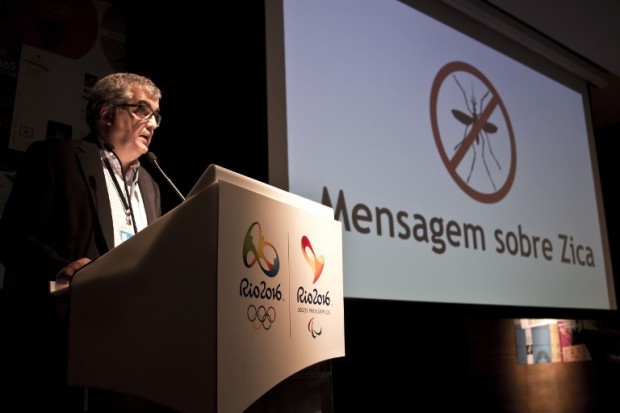Olympic travelers face tiny risk of Zika—study

Rio2016 Olympic Games Communications Director Mario Andrada gestures during a press conference in Rio de Janeiro, Brazil on February 2, 2016. Rio Olympics organizers said Tuesday they are concerned by the outbreak of the Zika virus in Brazil, but confident the problem will have cleared up by the time of the Games. AFP PHOTO/VANDERLEI ALMEIDA / AFP PHOTO / VANDERLEI ALMEIDA
Those traveling to Brazil for the Olympics face a tiny risk of getting infected with the mosquito-borne Zika virus, which can cause birth defects in pregnant women, US researchers said Monday.
Under a worst-case scenario, just three to 37 of the up to 500,000 people expected to go to Rio de Janeiro for the games, which start next month, could be expected to come down with Zika, said the report by the Yale University School of Public Health.
“The possibility that travelers returning from the Olympics may spread Zika has become a polemic issue that has led to athletes dropping out of the event, and without evidence, undue stigmatization of Brazil,” said study co-author Albert Ko, chair of the Department of Epidemiology of Microbial Diseases at Yale.
“This study provides data, which together with initial findings from Brazilian scientists, show that these concerns may be largely exaggerated.”
The research, published in the Annals of Internal Medicine, is based on a mathematical model that accounted for a series of factors, including recent Zika transmission in Rio de Janeiro, seasonal conditions and travel patterns.
The team found that more than half of visitors — including media, athletes and spectators — attending the Olympics would return to “high-income countries where there is negligible risk for establishing local spread of the virus,” said the study.
“Around 30 percent will travel to Latin American countries where transmission is already established, so they will not play an important role in further spreading the virus.”
Furthermore, the upcoming Olympic Games will take place when it is winter in Rio and mosquito activity has subsided, researchers said.
Birth defects
Zika was first reported in Brazil in 2015, though it may have arrived earlier, and is blamed for a surge in cases of microcephaly, a birth defect in which an infant’s skull and brain are unusually small and deformed.
The virus can be devastating to pregnant women and their offspring.
Women who are pregnant or considering becoming pregnant are urged not to travel to areas where the virus is circulating since the virus can also be transmitted though sex, barrier methods or abstinence are also recommended.
But for most other people, symptoms are so mild that the infection is often not noticed at all, and it goes away within 10 days.
The World Health Organization has previously said there is a very low risk of Zika — now present in dozens of countries in the Caribbean and Latin America — spreading internationally as a result of people traveling to and from the Olympics.
Not everyone shares that view. In May, an open letter addressed to the WHO and signed by 150 international doctors, scientists and researchers called for the August Games to be moved or delayed to help prevent the spread of Zika virus.
Holding the Games in Rio, the second worst affected city in Brazil, would be “irresponsible” and “unethical” and could risk spreading the virus to “poor, as-yet unaffected places” like Africa and South Asia, said the letter.
When it came to concerns about Africa, Yale researchers estimated that attendees returning to African countries would be infectious to mosquitos for only one to 14 days.
“These are low numbers in comparison with the overall opportunities for the virus to spread internationally through travel,” said Jimmy Whitworth, professor of international public health at the London School of Hygiene and Tropical Medicine, who was not involved in the study.














